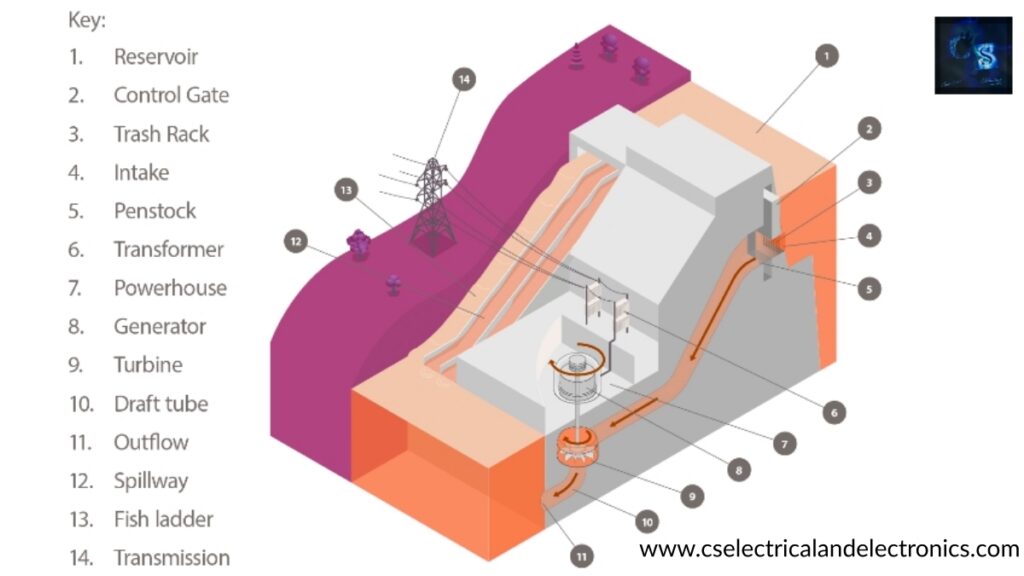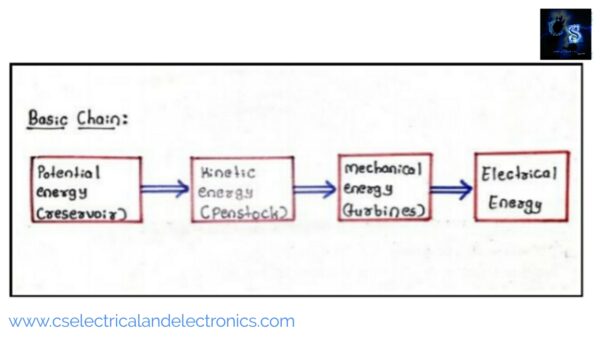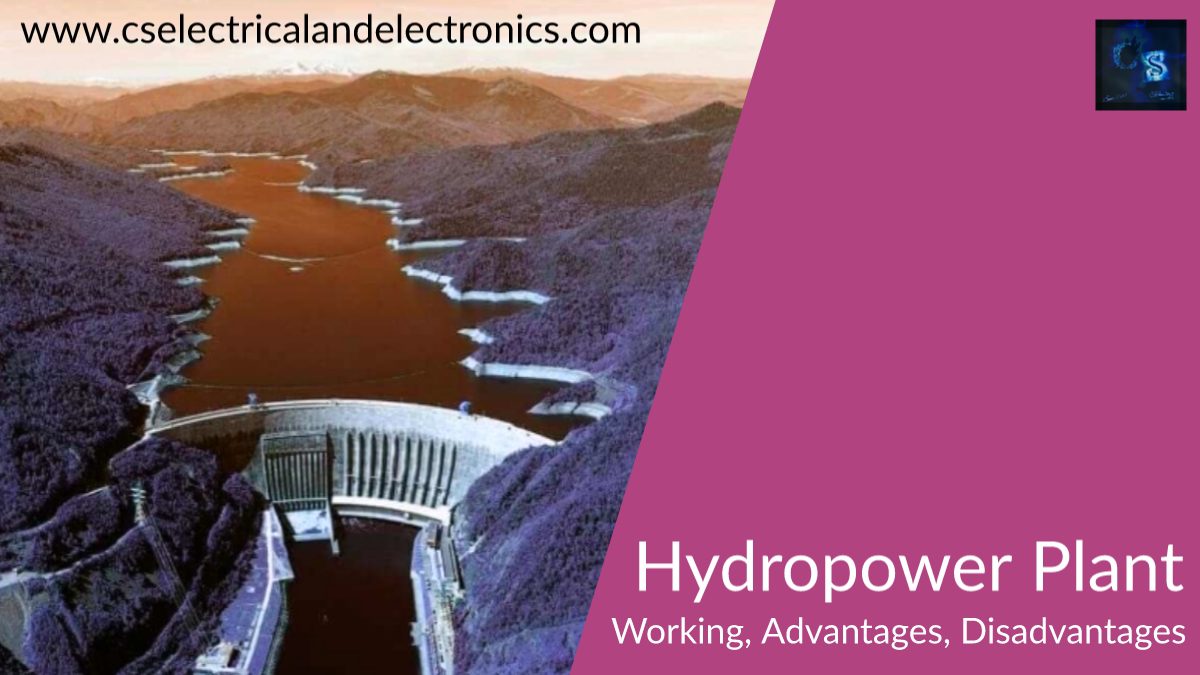Hydropower Plant Working, Site Selection, Advantages, And Disadvantages
Hello guys, welcome back to my blog. In this article, I will discuss hydropower plants, working of the hydropower plant, site selection for hydropower plants, advantages of the hydropower plants, and disadvantages of hydropower plants.
If you have any doubts related to electrical, electronics, and computer science, then ask questions. You can also catch me on Instagram – CS Electrical & Electronics And Chetan Shidling.
Also, read:
- Top 15 IoT Projects For Electrical Engineers, Electrical Engineering Project
- Top 10 Amazing Autonomous Vehicles Makers That Will Attract You
- Top 100+ Electrical & Electronics Quiz Questions With Explanation
Hydropower Plant Working
It’s one of the types of methods of power generation, which utilizes water as the main source. Through the potential energy of the water, it generates power.
Site Selection For Hydropower Plant
01. Availability of water
Water is the main source of hydroelectric power plants. A huge amount of water should be available so that the power plant can be built with a high head. The quantity of the water available will be estimated on the basis of the measurement of streamflow over a certain period or previous rainfall records.
02. Storage of water
There will be a wide variation of rainfall during the year. This makes it necessary to store water for continuous generation of power throughout the year.
03. Head of water
The head of the water depends upon the topography of the area. If the head is more then potential energy will be more.
04. Choice of the dam
The important consideration in the choice of the dam is safety and economics. Failure of the dam may result in substantial loss of life and property. The dam must satisfy the stability test for shock loads and unusual floods.
05. Distance from the power station to load center
The distance should be less between the power station and load center so that the cost of transmission of power becomes less.
06. Accessibility of the site
The plant should be easily accessible by rain and load for transportation of plant equipment.
Diagram Of Hydropower Plant

The hydroelectric power plant consists of mainly 8 components.
01. Reservoir
The purpose of this reservoir is to store the water which will be further used to generate electricity. The water will be stored during the rainy season. By storing water we get potential energy.
02. Dam
The dam will be constructed across the river or lakes to provide the head of the water. These are classified based on their function, material, shape, and structural design.
03. Spillway
This spillway is the safety wall for the dam. It discharges the existing amount of water from the reservoir into the rivers. That means spillway is required to reduce overtopping. It keeps the reservoir level below the predetermined value.
04. Intake
Intake acts as a filter in Hydro Electric power plants. It removes unwanted material from the water. In this stage, the potential energy will be converted into kinetic energy.
05. Penstock
This is the channel between the dam and turbine which helps to increase the kinetic energy of the water. It is made up of stainless steel.
06. Surge tank
It acts as a pressure release wall for the water. It reduces the water hammer effect. That means it holds the water whenever there is no requirement of load on the turbines, and similarly, it discharges water whenever there is a requirement of load on the turbines.
07. Prime mover/turbine
For this reason, the kinetic energy will be converted into mechanical energy, which is responsible for the rotation of the shaft of the turbines. Commonly used turbines are Kaplan, Francis, Pelton, cross flow, etc.
08. Alternators / Generators
These are normally located near the foot of the dam. Water is brought to alternators with the help of penstock. In this region, the mechanical energy is converted to electrical energy. Thus final power will get in this stage.
Working Of Hydropower Plant
The hydroelectric power plant is a type of plant which utilizes the potential energy of water for the generation of electrical energy. To generate electricity, water must be in motion, which is referred to as kinetic energy. When the flowing water turns to the blades of the turbine, the kinetic energy of water changes to mechanical energy. The turbines rotate the electrical generator rotor which in turn converts mechanical energy to electrical energy.
The dam creates the head of the water from which water flows. Penstock carries the water from the Dam to the turbine, and it provides kinetic energy. The fast flowing water through the penstock pushes turbine blades. The water forces on turbine plates and rotates the generator rotor, which in turn generates electricity.
Basic Chain Of Hydro-Electric Power Plant
The overall conversion of energy can be represented as below.

In the generating station of the hydroelectric power plant, it utilizes the potential energy of the water at a high level for the generation of electricity which is known as a hydroelectric power plant.
Advantages Of Hydropower Plant
- Manpower will be less.
- Low maintenance cost.
- Skilled laborers are not required.
- No fuel cost.
- Pollution-free.
- longer life.
Disadvantages Of Hydropower Plant
- Per capita investment will be more.
- A huge amount of water is required.
- Uncertainty in the generation of power.
Some Of The Hydro-Electric Power Stations In Karnataka
01. Alamatti power station:
Capacity: 290MW.
Turbine: Kaplan Units: 6 ( 55MW generators (5) ) (15MW generators (1) )
02. Shivanasamudra Power station:
Capacity: 42 MW
03. Gerusoppa Power Station:
Capacity: 240MW
04. Mahatma Gandhi power station:
Capacity: 120MW
05. Shimshapura Power Station:
Capacity: 17.2 MW
06. Linganamakki Power Station:
Capacity: 88MW
I think now you are clear with hydropower plant working, site selection, advantages, and disadvantages. I hope this article may help you all a lot. Thank you for reading.
Also, read:
- 10 Tips To Maintain Battery For Long Life, Battery Maintainance
- 10 Tips To Save Electricity Bills, Save Money By Saving Electricity
- 100 (AI) Artificial Intelligence Applications In The Automotive Industry
- 100 + Electrical Engineering Projects For Students, Engineers
- 1000+ Automotive Interview Questions With Answers
- 1000+ Control System Quiz, Top MCQ On Control System
- 1000+ Electrical Machines Quiz, Top MCQs On Electrical Machines
- 1000+ MATLAB Simulink Projects For MTech, Engineering Students

